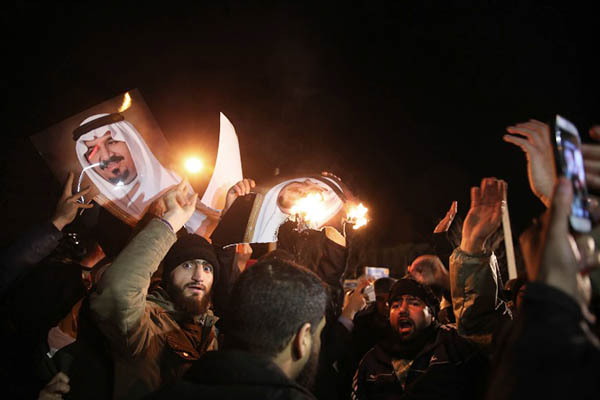
Mohammadreza Nadimi-ISNA—AFP
What led to the rapid breakdown of diplomatic ties between the Middle Eastern rivals?
The latest crisis between regional rivals Iran and Saudi Arabia worsened Monday, three days after it erupted with the execution of Shia cleric Sheikh Nimr al-Nimr.
A snapshot of events so far:
Jan. 2
Riyadh announces the execution of Nimr, 56, who had voiced bitter opposition to the Saudi royal family, and 46 other “terrorists.”
Demonstrators rally in Qatif, eastern Saudi Arabia, where most of the Shia minority live. Nimr was arrested in 2012, three years after calling for Eastern Province’s Qatif and Al-Ihsaa governorates to be separated from Saudi Arabia and unite with Bahrain.
Tehran warns that Riyadh would “pay a high price” for the execution, but the Saudis call Iran “a state that sponsors terror.”
Diplomatic envoys from both countries are recalled.
Gulf monarchies express support for Saudi Arabia, in particular Bahrain, which faces chronic unrest among its Shia minority, and where police use tear gas to disperse demonstrators.
Indignation floods the Shia world. In Iraq, hundreds demonstrate in Karbala and prominent Shia lawmaker Khalaf Abdelsamad calls for the closure of Riyadh’s newly reopened embassy in Baghdad after a 25-year hiatus.
In Tehran, hundreds of demonstrators set fire to the Saudi embassy before police make 40 arrests. In Mashhad, northeastern Iran, four more are arrested after a crowd torches a Saudi consulate.
Jan. 3
Iran’s supreme leader Ayatollah Ali Khamenei warns that Saudi Arabia will face “divine revenge” for executing Nimr. Iranian President Hassan Rouhani denounces attacks on the Saudi embassy and consulate as “totally unjustifiable.”
Hezbollah chief Hassan Nasrallah slams the Riyadh government as “criminal and terrorist”. “This is not something we can ignore,” he warns.
Thousands of Shias demonstrate in Pakistan and violence breaks out in Bahrain and India-administered Kashmir.
Saudi Arabia’s official SPA news agency says gunfire aimed at police in Awamiya, eastern Saudi Arabia, killed one person and wounded a child.
Saudi Arabia announces the rupture of diplomatic relations with Iran and gives Tehran’s diplomats 48 hours to leave the kingdom.
The United States urges the Iranians and Saudis to act to ease tensions.
Jan. 4
Iran accuses Riyadh of seeking to stoke regional tensions and says the Saudi decision to cut ties will not deflect attention from Riyadh’s “big mistake” of executing Nimr.
Thousands of supporters of prominent Iraqi Shia cleric Moqtada al-Sadr protest in Baghdad to demand that it sever ties with Riyadh. Blasts rock two Sunni mosques in central Iraq killing one man, while a muezzin is gunned down south of Baghdad.
Bahrain and Sudan cut diplomatic ties with Iran and the United Arab Emirates downgrades its relations.
In Tehran, 3,000 people protest against the Saudi royal family, and burn Israeli and U.S. flags. Saudi Arabia cuts all air links with Iran.
Russia offers to mediate between Riyadh and Tehran. British Prime Minister David Cameron says the tensions are “hugely concerning,” condemning the execution.
U.S. Secretary of State John Kerry calls both countries’ foreign ministers to urge calm.
The U.N. peace envoy for Syria, Staffan de Mistura, heads for Saudi Arabia and Iran for talks aimed at defusing tensions.
The Arab League schedules talks at Saudi Arabia’s request for Sunday to discuss attacks in Iran on the kingdom’s embassy and consulate.
